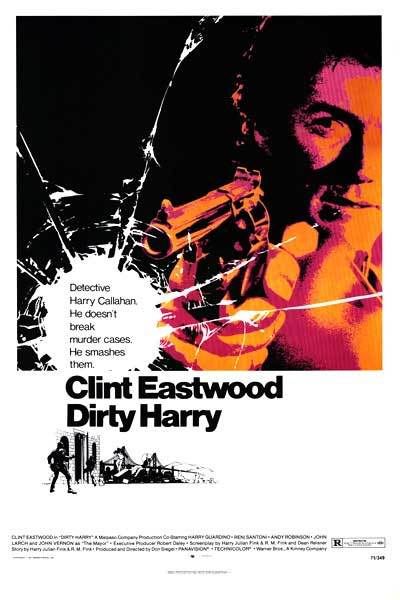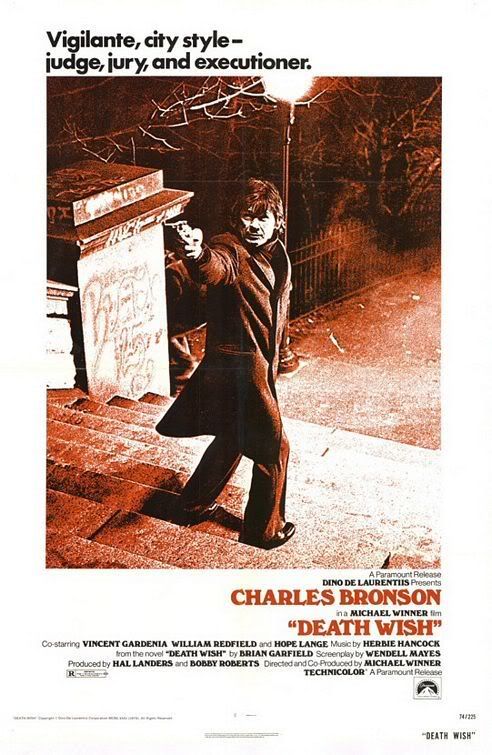
Continuing my theme this month of 70's films, I've decided to dive more into the term "antihero". What is an antihero? A good guy? A bad guy doing good things? A good guy doing bad things maybe? Lots of people will have their own definition. Harry Callahan could care less though. The reason why? Is because he is the ultimate antihero, one with a police badge. Clint Eastwood created one of the most iconic characters in film history with his portrayal of hard boiled San Francisco Inspector Harry Callahan. This film was exactly what everyone needed at the time of it's release, a man who wouldn't take it anymore, doing things his own way, and actually being commended for it!?! Directed by Don Siegel of Invasion of the Body Snatchers fame, this gritty police drama gave a new perspective to police films for it's visceral portrayal of violence and character study of someone who could come off as a loose cannon in the eyes of some, but is ultimately a hero in his own respect. On the trail of a sniper named "Scorpio" who continues to antagonize the police by sending them letters of a ransom demand or he will shoot people at random. Controversial at the time, the film was widely praised and also protested being that the Scorpio killer was also similar to the "Zodiac Killer" who was doing almost the same thing in San Francisco at that time. What sets this film apart from the rest is the fact that we see the urban setting usher in a new era of action films. The Wild Bunch in 1969 was a way of saying the "western" is almost dead and we needed something new. Dirty Harry is the answer, a western set in contemporary times with a hero who still "Shoots first and asks questions later" A pillar in 70's film history and a character that resonates to this day in the form of others such as Officer Alex Murphy of Robocop, John McClane in Die Hard, and even Bruce Wayne in the Batman series. Continuing with a franchise that went nearly 20 years strong, Harry Callahan will always be considered to be the first policeman to get things done. On that note, I leave you with my favorite quote from the film courtesy of IMDB.com
Harry Callahan: Well, when an adult male is chasing a female with intent to commit rape, I shoot the bastard. That's my policy.
The Mayor: Intent? How did you establish that?
Harry Callahan: When a naked man is chasing a woman through an alley with a butcher's knife and a hard-on, I figure he isn't out collecting for the Red Cross.
[walks out of the room]

After the success of Harry Callahan and the continuing anger of incidents such as Watergate, Vietnam, Kent State University shooting, etc...the creative forces continued to grow more angry by the second when things took so long to see concluded and we felt helpless. Here comes the next antihero of the 1970's to the rescue, Paul Kersey. So many people were offered the role of the architect who didn't want to sit around waiting for the justice to take care of his problems. Everyone was considered, Steve McQueen, Clint Eastwood, even blue eyes himself Frank Sinatra! Ultimately, the producers decided on an up and coming star in his own right and with his own style. Charles Bronson! Known to some as Harmonica of Once Upon a Time in the West, and Danny Velinski aka "The Tunnel King" in the star studded "The Great Escape". It was Death Wish that catapulted Bronson to a status above many others for creating a character people really cared about. Paul Kersey is a successful architect and a bleeding heart liberal whose life is destroyed after his wife and daughter are attacked by punks posing as grocery boys. His wife eventually succumbs to the events while his daughter is left catatonic. Paul first spends his time playing ball with the legal system and giving them all info they ask for in order to solve the case. Eventually, he becomes another statistic of the crime ratio and no justice is served. His liberal outlook on life is then changed by his contempt for the legal system, criminal underworld, and life in general. Receiving a pistol as a gift on a business trip, Kersey then becomes walking bait on the streets of New York City murdering anyone who tries to hurt him. The effect is felt city-wide as criminal activity drops and the morale of the average citizen rises. Will the police stop him or commend him for doing the job they really can't do? Released in 1974, Death Wish was a hit with critics and audiences alike and spawned many sequels. It brings about the idea of what if justice was done in the hands of others? Does the legal system sometimes protect the guilty as much as it does the innocent? or does the balance somehow fall out of balance for those in the other spectrum? The film is powerful in rejuvenating a sense of hope that sometimes gets lost when we fall victim to things out of our control, yet also raises many questions from a moral stand point. The sequels somehow along the way get lost in it's absurdity though denying the power the original has is impossible. Kersey unlike Harry Callahan, was the everyman standing up to the scum that surrounded him. People flocked to this character in droves because of it's general appeal. Who needs a badge when all you need is a gun? The character to this day still ushers in the same effect and power as we've already seen in the 2007 remake "The Brave One" with Jodie Foster, and a remake to be made and released in 2009. No matter how many times the story is re-told, it will never be the same as it was fueled by the times, frustration, anger, and glimmer of hope this "antihero" brought to the screen. I give you Paul Kersey.
Sam Kreutzer: I'll bet muggings are down, and they're afraid to tell us.
Paul Kersey: There's only one way to find out. Take a walk on Columbus Avenue tonight
Clip of Death Wish (1974)
Clip from Dirty Harry (1971)

1 comment:
Do you think Blockbuster would have most of these in-stock?
Post a Comment